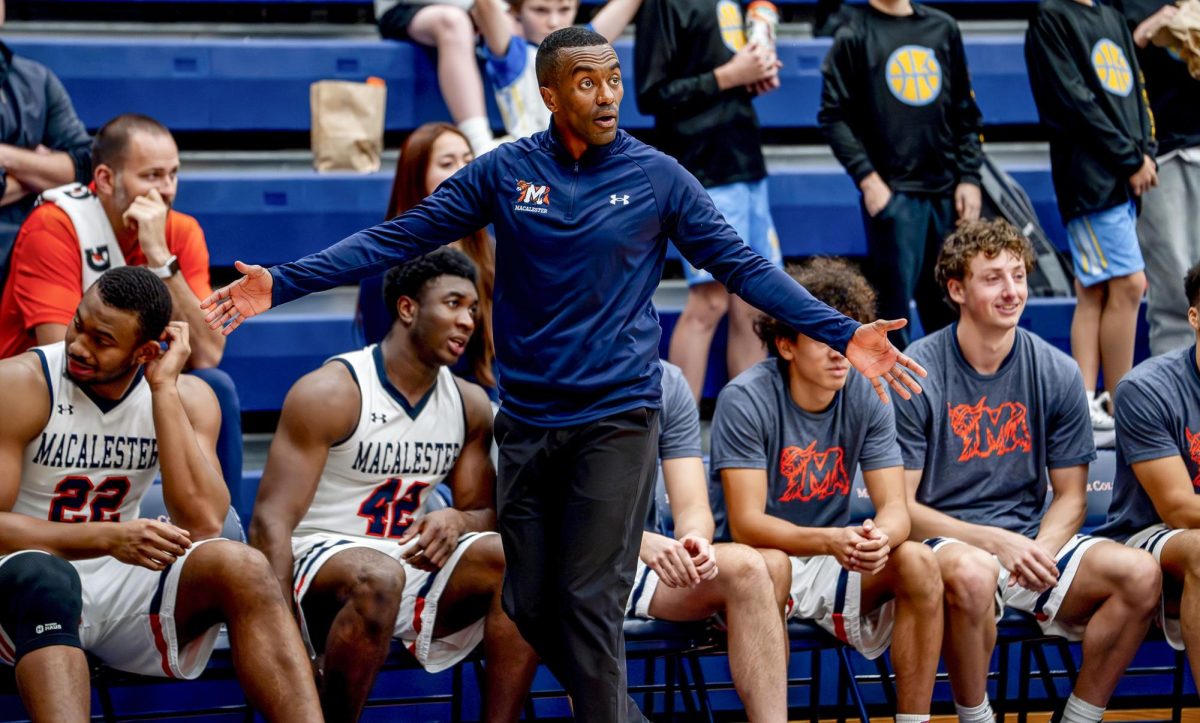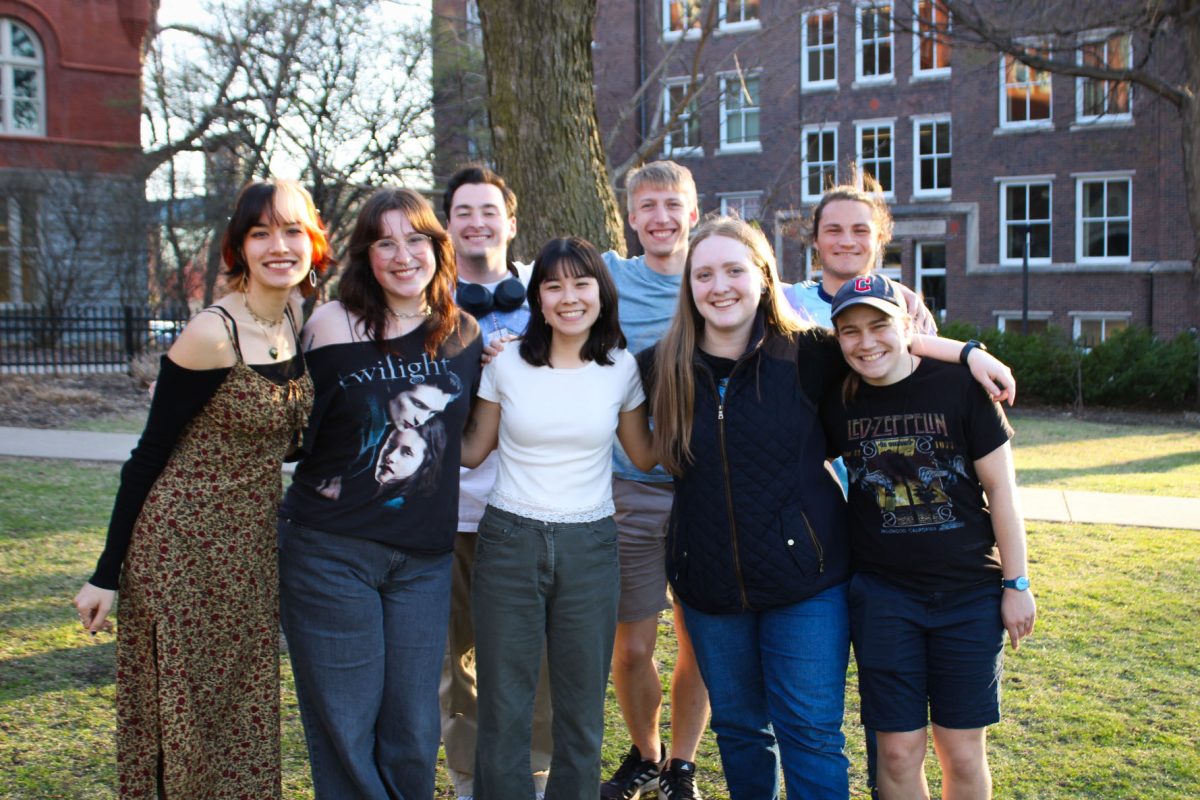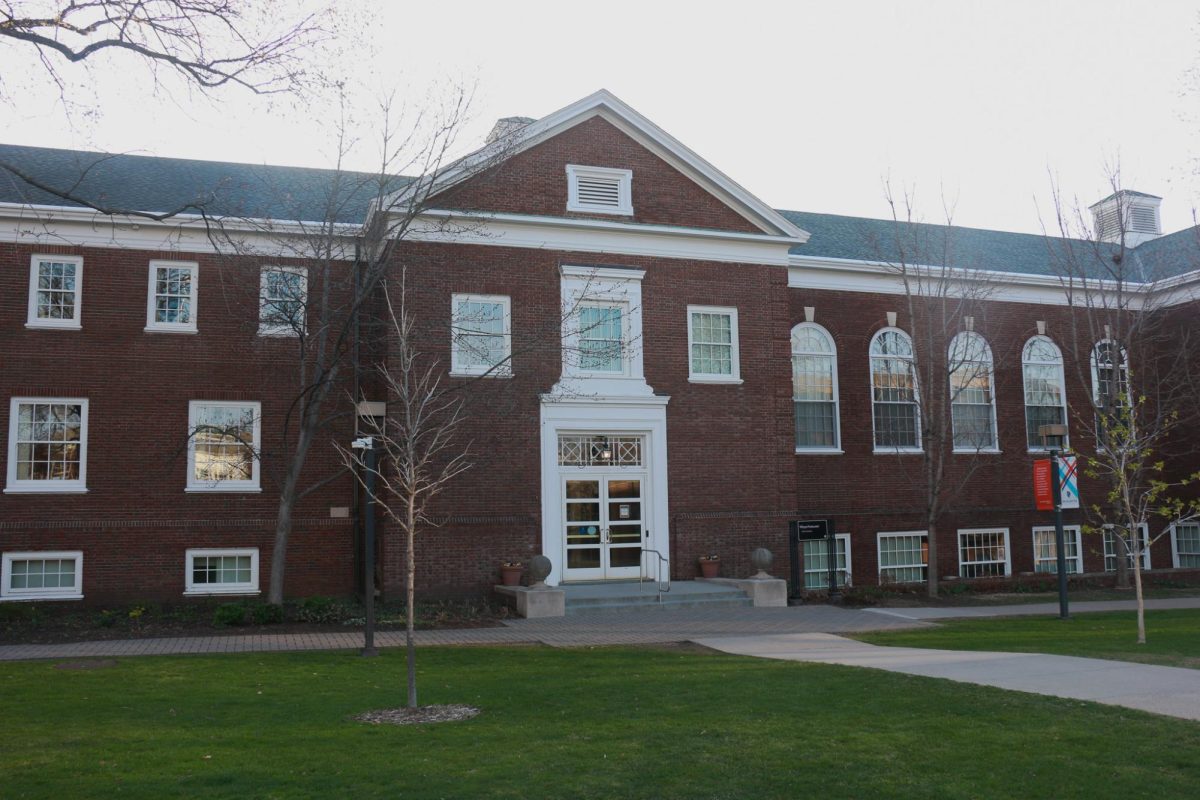Building on students’ calls for a ceasefire in Gaza and the West Bank throughout the 2023–2024 academic year, the conversation surrounding the ongoing genocide against the Palestinian people remains a critical one on Macalester’s campus as the fall 2024 semester begins.
The review process for two proposals submitted by Mac for Palestine — one calling for the divestment of the college’s endowment assets from companies financially tied to Israel, and another demanding that the college end approved study away at two Israeli universities — now approaches its final stages.
Al Jazeera reports that since Oct. 7, more than 40,800 Palestinians have been killed because of Israeli attacks, and more than 1,139 people in Israel have been killed as a result of the violence.
This April, United Nations officials concluded Israel’s military operations were ‘scholasticide,’ a term that refers to the systematic destruction of educational infrastructure and killing of teachers and students. Officials cited damage to or destruction of more than 80% of schools in Gaza in Israeli attacks.
At other colleges and universities, shifts in administrative personnel and security policies following controversy related to the genocide have continued over the past few months of protest on campuses.
The success of either proposal would establish Macalester as one of few American universities to take a divestment-based stance on the genocide of Palestinians. Quinn Roberts ’25, who collaborated with other students involved in Mac for Palestine to write the coalition’s study away proposal, understands that this may put Macalester into national spotlight.
“I understand administration’s fear in [taking a stance], but I hope they understand that being afraid in this moment doesn’t absolve you of the responsibility of also being complicit,” Roberts said. “If you are being complicit, that is a problem. At the end of the day, we are all paying students, and we don’t want to be paying money to an institution that is willing to be complicit in genocide, in ethnic cleansing and apartheid. So, bravery in this moment is not just a desire for us. … It is a requirement, at least for me, that the institutions I support are willing to be brave in the face of these atrocities.”
At Macalester, further action surrounding the proposal review processes picked up in early summer when President Suzanne Rivera received the SRC’s report on the proposal regarding the divestment of endowment assets on June 5. In an email sent to students, faculty and staff on June 10, Rivera shared that she had accepted the SRC’s recommendation that the proposal be forwarded to the Board of Trustees (BoT) for further consideration.
An Ad Hoc Committee — composed of eight Trustees, each appointed by Board Chair Carrie Norbin Killoran ’94 P’27 — was formed on June 17 to review the proposal and held their first meeting on July 8.
“During a series of five meetings this summer we have reviewed lessons from the Fossil Free Macalester proposal (divestment) process conducted in 2021, how the college manages its endowment, potential legal liability, the work of the SRC and Macalester’s “Guidelines for Investor Responsibility” and key principles applicable to a proposal for divestment,” Ad Hoc Committee Chair Decker Anstrom ’72 wrote in an email to The Mac Weekly.
The Ad Hoc Committee is offering two opportunities for Macalester community members to offer input surrounding the divestment proposal, including an online feedback form that anyone can complete and two virtual listening sessions for Macalester students, faculty and staff.
The listening sessions will be held via Zoom on Tuesday, Sept. 17 from 5:30-7 p.m. and Monday, Sept. 23 from 4:30-6 p.m. Registration is required, and those in attendance will each be given a five minute time slot for speaking.
Anstrom explained that the committee has not determined a date by which it will share their decision regarding the divestment proposal.
“Beyond our extensive outreach and engagement efforts this month we have not set a deadline for submitting our report and recommendations to the Board,” Anstrom wrote. “There are complex issues involved in the consideration of the proposal that deserve careful, thoughtful attention that can not be rushed.”
According to Rivera, the proposal is currently on the sixth and final step of the official divestment process outlined in the “Guidelines for Investor Responsibility.”
On June 4, Mac for Palestine submitted their proposal to remove the Hebrew University of Jerusalem and University of Haifa as pre-approved programs, create pathways to foster connections with Palestinian universities and uplift Palestinian perspectives in curriculum and Macalester-sponsored events. According to Academic Affairs Committee (AAC) Chair Tristan Niedzielski ’25, although these two universities remain pre-approved programs, Macalester has not permitted students to study away at these universities this semester, due to safety concerns.
The proposal also included a suggestion to establish a program that would allow five or more Palestinian students who have suffered displacement to attend Macalester with a full-ride scholarship.
On June 24, Rivera received the SRC’s report on the proposal, which recommended that she refer the matter to the Educational Policy and Governance (EPAG) committee and the Faculty Advisory Council (FAC), before referring it to the Study Away Review Committee (SARC). The report cited that curriculum-related matters concern EPAG and FAC, and that the Faculty Handbook designates SARC as responsible for approving specific study away programs.
The report also attributed jurisdiction over increasing connections with Palestinian universities to the Kofi A. Annan Institute for Global Citizenship (IGC) and determining scholarships to the president.
After conversations with Rivera and within the committees, committee members will make a recommendation of whether they believe Macalester should continue sponsoring study away programs with the Hebrew University of Jerusalem and the University of Haifa. Niedzielski — one of two student representatives on EPAG — has mixed feelings on the decision.
“I am speaking for myself, and I also know that other people in EPAG share this feeling: it felt like it was being kicked to EPAG,” Niedzielski said.
Regardless of whether EPAG recommends or does not recommend that Macalester cut ties with Hebrew University of Jerusalem and University of Haifa, faculty members will have the opportunity to vote in response to EPAG’s recommendation. This will be determined by a 50% plus one majority vote.
“Either way, if they decide to accept their proposal or deny the proposal … it’s no longer in Rivera’s wheelhouse,” Niedzielski said. “Students can’t be like ‘well, President Rivera rejected this proposal.’ Now it’s EPAG; now it’s the faculty. … With that being said, I do think it’s really important that this allows direct input from both myself and the other students on EPAG, as well as faculty members.”
According to Niedzielski, this decision places more agency into student’s hands as well.
“Pretty much nobody at Mac has an interpersonal relationship with any of the members of the Board, but we do with our faculty members,” Niedzielski said. “We have classes with them. They’re our advisors. We talk with them regularly. We formed these relationships with people. I think it’s really important for students to go out and talk to their faculty members and be like ‘hey, this is going to be a vote that you’re going to have at a faculty meeting at some point.’”
Unlike Mac for Palestine’s financial divestment proposal, there is currently no feedback form for students to share their perspectives directly with EPAG. However, Niedzielski intends to change this. They also hope to invite members of Mac for Palestine into an EPAG meeting to present their proposal.
During a faculty meeting on May 7, Macalester faculty voted in favor of passing a statement “call[ing] on the United States to demand Israel immediately and permanently cease attacks on the Palestinian people.” The statement also urged the BoT to immediately divest from companies tied to the oppression of Palestinians and expressed faculty’s support of further deliberation on the proposal to end approved study away programs to Israel.
In the months that followed, the SRC deliberated over both of the proposals, with their work shaped by the Board-approved “Guidelines for Investor Responsibility.”
In an email to The Mac Weekly, SRC Chair Duchess Harris wrote that she met with the BoT on Aug. 16, where she presented an overview of the SRC’s work in reviewing the divestment proposal.
Harris did not agree to meet for an interview with The Mac Weekly and did not provide additional information on what considerations guided the SRC’s reasoning.
Toward the end of the spring 2024 semester, Professor of Sociology and Faculty Associate Dean of the IGC Khaldoun Samman was among those originally asked to serve on the SRC. However, following the May 7 faculty meeting, Samman decided to resign from the committee because he felt that the SRC formation process was not entirely appropriate. As one reason, he pointed to the fact that faculty and staff were not involved in the appointment of SRC members, including the committee chair.
“From my experience, once the committee is established, the committee members themselves will identify the chair,” Samman said. “In these kinds of important committees, practicing what is in the faculty handbook carefully, I think, is important to having trust in the process, and I did not feel that was the case.”
Samman added that he believed although Rivera intended to form a “legitimate” committee, her process of choosing those to serve on the SRC — which did not include input from faculty and staff — led her to create a biased committee of individuals who largely shared her perspective on the issue.
In an email to The Mac Weekly, Rivera stated that she appointed SRC members after consulting with the senior leadership team, with “[her] goal to include students, faculty, staff and alumni from a wide variety of perspectives and experiences.”
Samman emphasized, however, that his decision to resign from the committee was primarily guided by his choice to sign the faculty statement — which expressed disapproval of the SRC formation process — at their May 7 meeting.
“When the resolution by faculty to address this issue came up, I was part of the group that signed that, and it led to some awkwardness of my legitimacy of being on the committee anymore because I am now part of this Mac for Palestine faculty list,” Samman said. “It was a tension between ‘do I participate in this SRC that I think is compromised but make the best of it?’ or ‘do I go with signing this petition that I agreed with?’ and since I did feel it was compromised by the way it was put together and composed, I decided to drop out.”
Samman also criticized some of those who did not express support for the resolution put forth at the faculty meeting for their apparent attempts to avoid talking about the genocide in Gaza.
“When I was at the [May 7] faculty meeting, [I thought that] the way some of the faculty argued against the proposal was, I’ll put it bluntly, disingenuous,” Samman said. “‘There’s so many other issues going on. Why should we highlight this one?’ … It’s an attempt to just not deal with the issue … but I think it’s a discussion we need to have.
“Why are you shutting down this very important issue that is obviously, right now in the world context, a major traumatic experience that people are having? And you’re telling them that we should not care about your issue because there are other issues? That is a very problematic stance,” Samman added.
This kind of unwillingness to engage in conversations about Palestine is nothing new to Samman, however, who explained that his family has been facing this issue for his entire life. He shared that his mother’s side of the family, originally from the Palestinian city of Hebron, was dispossessed and forced to move from one area to the next until finally arriving in Jordan where he grew up.
“Honestly, ever since we came to the United States with my family, we just couldn’t believe the way the Israeli-Palestinian issue has been dealt with,” Samman said.
Roberts, who helped write the study away proposal, hopes for both proposals’ successes, but he is committed to continuing his work with Mac for Palestine and finding alternative pathways to divestment if the current one does not lead to it.
“Fear doesn’t drive people to action — hope does,” Roberts said. “Being able to look towards where progress is being made and things are being done is going to be your best bet if you want to jump in and help. You have to believe that the work is going to work.”
Samman expressed a similar sentiment, calling for students, faculty and staff alike to set aside any potential fears and take a stand.
“You can’t just pretend [to] be careful and be polite anymore, you have to speak out,” Samman said. “There’s a moment where it’s just too much. That fear has been part of my life — to be able to speak out throughout my career — but I’ve gotten to the point where I just can’t be quiet anymore. I have to speak, no matter if I’m a professor or the associate dean. All that is not enough to make me feel like I have to be safe and be quiet anymore.”











Rev. Paul D. Beran • Sep 24, 2024 at 1:55 pm
Please, please divest from Israel and companies so involved with Israel. Do not allow genocide to continue. Divestment is what finally changed the racist stance of South Africa. How can Macalester talk about justice and continue investments in Israel?